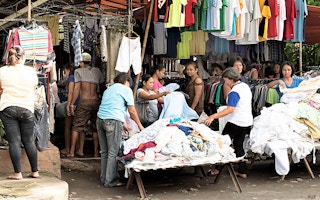The Philippines is the most receptive market to secondhand goods in Southeast Asia, but not because of the environmental savings of buying pre-loved items, according to a report by Singapore-based e-commerce website Carousell.
Buying and selling secondhand items is viewed as a more circular form of consumerism, as no extra production or processing is needed for new items.
In the survey titled The Carousell Recommerce Index 2021, 92 per cent of Filipino respondents said they have bought secondhand items including unused and brand new items by casual everyday sellers, but mainly because of value for money.
Affordability was also the main motivation of respondents from Hong Kong and Singapore, but they ranked highest for choosing to buy secondhand items for environmental reasons.
“The top rankings of Hong Kong and Singapore in choosing secondhand because it was more environmentally friendly is likely driven by their higher economic development and millennial respondents,” read the report, which surveyed 3,029 respondents across the Philippines, Hong Kong, Indonesia, Malaysia, Myanmar, Singapore, Taiwan and Vietnam for one week in the month of June 2021.
In the survey, 95 per cent of millennials in Southeast Asia and Hong Kong felt that purchasing pre-owned items is more sustainable, half of them saying that they felt very strongly about it.
With growing global concern over the environmental impact of overconsumption, there is an increasing shift towards “recommerce”, or buying and selling items, including both new and used.
Ralph Garcia, country marketing head of Carousell Philippines, said the survey was conducted amid the Covid-19 pandemic to encourage recommerce.
“Since the pandemic has drastically changed consumer behaviour over the past few years, we came up with the Carousell Recommerce Index to find out where we are now, and what we can do to encourage Filipinos to consider buying secondhand as their first choice to promote a circular economy and encourage them to lead more sustainable lifestyles,” Garcia said.
Recommerce: a way to curb e-waste and fast fashion
Consumer electronics and fashion are two industries believed to manufacture products with shorter lifespans to perpetuate consumerism and the buy-throw mindset, noted the study.
Throughout the region, electronics and related categories were the most popular types of items that respondents felt comfortable buying and selling, followed by apparel.
Malaysia, Vietnam and Myanmar ranked computers, mobile phones and tablets, as the categories they felt most at ease buying from. Driven by popular gaming consoles, toys and games ranked top for both buying and selling in Hong Kong.
Electronics is another cyclical industry that fuels global e-waste, which is estimated to double in volume over the next 30 to 50 years, added the study.
Asia consistently generates the highest quantity of e-waste globally, generating 24.9 megatonnes of e-waste in 2019, according to the latest annual e-waste report by the United Nations University.
Women’s fashion is the top category for secondhand items in the Philippines, Indonesia and Taiwan.
The report cited a 2019 analysis by consulting firm Mckinsey & Company that the fashion industry, perpetuated by buy-throw culture, contributes to approximately 10 per cent of all carbon emissions emitted globally. Over 79 trillion litres of water is consumed annually to sustain the production of cotton and other textiles, and over 92 million tonnes of waste is created per year.
The report read: “In the Southeast Asian region, there is a pressing need to evaluate consumer behaviour and understand how it can be plied against the locomotion of growth-driven consumerism. But no matter how responsibly products have been made, there is an urgent need to stop buying new.”

















